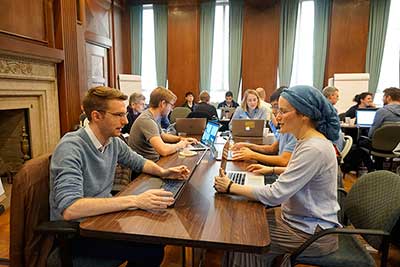Carnegie Mellon Hosts Large Synoptic Survey Telescope Hack Week
While the Large Synoptic Survey Telescope (LSST) is being built in Chile, researchers from around the world are working hard to develop the research infrastructure that they will need to interpret the vast amounts of data that the telescope will create as it surveys the sky over the course of 10 years.
To expedite research progress toward using LSST data to measure dark energy, 65 faculty, post-docs and graduate students from around the world came to Carnegie Mellon’s Pittsburgh campus for the LSST Dark Energy Science Collaboration (DESC) Hack Week on Nov. 7-11. Hack Week was organized by McWilliams Center for Cosmology researcher and Associate Professor of Physics Rachel Mandelbaum. Mandelbaum is a member of the leadership team of the DESC and also chairs its collaboration meeting committee.

The researchers and students, who included physicists, computer scientists and statisticians, worked on projects that included building a pipeline for weak lensing analysis with the LSST and testing it using existing data, and writing and testing software for identifying and classifying different types of supernovae, which can be used to measure the expansion rate of the universe.
The LSST’s decade-long survey will map tens of billions of stars and galaxies. The unprecedented data set created by the telescope will allow scientists to determine the properties of dark energy and dark matter and the composition and history of our galaxy and solar system.
